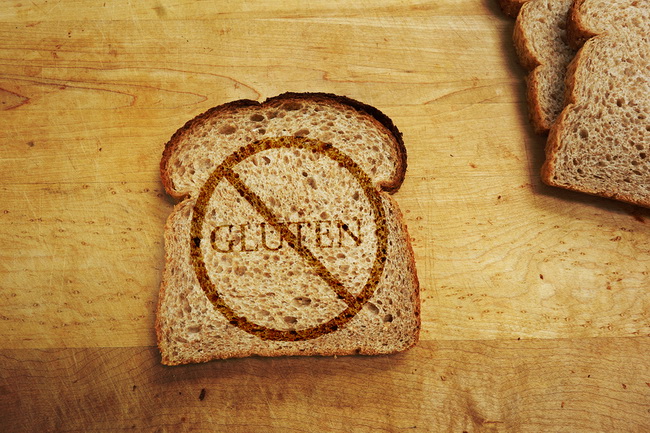- Make It Yourself Lavender Heart-Shaped Bath Bombs!
- 20 Things You Never Knew About “Down There”
- 12 Best Foods For Those Suffering From Arthritis Pain
- 12 Personal Hygiene Mistakes Almost Everyone Makes (Mom Never Told You About #4!)
- 15 Medicinal Plants And Herbs From The Cherokee People
- 12 Mind-Blowing Benefits Of Drinking Coconut Water During Pregnancy
- 12 Outstanding Winter Foods That Won’t Fatten You Up Like A Christmas Turkey
Do You Have Gluten Sensitivity? 10 Common Symptoms

Photo credit: bigstock.com
Although celiac disease is the only medically recognized problem concerning gluten sensitivity, many people have a sensitivity to gluten. This is a very serious issue in our modern world. Thousands, perhaps millions, of people suffering from this are being deprived of nutrition and putting up with unnecessary pain because of a lack of awareness.
Gluten sensitivity has been linked to a rather wide amount of health issues and diseases from dementia to skin problems. One of the problems is that doctors currently only have testing for true celiac disease. This causes them to negate your complaints if you test negative for celiac disease. If you recently took a trip to the doctor and they told you that you must have some other problem, don’t despair. An incompatibility to gluten isn’t the same thing as celiac disease, so a negative test result doesn’t mean that what you are feeling is all in your head. There are various degrees of sensitivity to gluten, even allergies to gluten. For most mainstream medical persons, however, it’s a black and white thing; for them, either you have celiac disease or you don’t.
Luckily, there is a growing awareness about gluten sensitivity. Most people who find that they are overly sensitive to gluten but test negative for celiac disease call their problem non-celiac gluten sensitivity or NCGS. Estimates are that about 1 out of every 20 Americans have some level of NCGS. Several research scientists, the ones who place so much emphasis on their double blind, randomized, placebo controlled studies, found that even they were able to validate the condition of gluten sensitivity.
Gluten is a protein that is all around us. You will find it in hair care products, foods containing grain, and even in kids’ toys, such as Playdoh. If you have a sensitivity to gluten, it can have an adverse effect on every single tissue in the body. Although some people are quick to dismiss gluten sensitivity as a hoax or a scam, tell that to the 90 or so million Americans who suffer from this.
In order to validate your concerns, the first thing you must do is educate yourself. Continue to read.
Continue to Page 2

Photo credit: bigstock.com
Some of the most common symptoms of gluten sensitivity are:
1. Digestive Problems – Including gas, abdominal pain, bloating, and IBS.
2. Cognitive Issues – Such as an inability to focus, dizziness, tingling sensations in the extremities, and brain fog.
3. Extreme Fatigue – If you become abnormally tired during the day, this is often a sign of gluten sensitivity.
4. Symptoms of Fibromyalgia – Although some doctors will deny it, the weakness and skeletal pain that most people call fibromyalgia is actually a sensitivity to gluten.
5. Hormonal Imbalance – If you suffer from PMS, extreme menopause symptoms, or unexplained fertility problems, you could have a gluten sensitivity.
6. Joint Pain and/or Inflammation – Many people who are suffering from inflammation or joint pain do not have arthritis or other issues, they are simply overly sensitive to gluten, or they are allergic to gluten.
7. Emotional Issues – Depression, drastic mood swings, panic attacks or extreme feelings of anxiety when there is no cause for such feelings might be a gluten sensitivity.
8. Frequent Headaches and/or Migraines
9. Skin Rashes – Unexplained rashes or other types of skin problems, such as psoriasis or eczema.
10. Keratosis Pilaris – This is another type of skin issue that many people who have a gluten sensitivity develop. This skin issue causes rough, discolored bumps and/or hardened patches of skin, usually around the arms, thighs, or even on the cheeks of the face.
Continue to Page 3

Photo credit: bigstock.com
How can you test for a gluten intolerance?
Unfortunately, there isn’t much to go on at the moment. The only two reliable methods are blood tests and the elimination diet. Blood testing is pretty obvious, but many people are reluctant to return to their doctor after they have been told that they have no problem with gluten. This is why most people opt for the elimination diet.
If you decide to go for blood testing, see if there is a Cyrex lab close to where you live. They offer a comprehensive blood test which will screen you for all gluten and wheat proteins and enzymes to determine if you have a problem.
Otherwise, most people simply try the ease of the elimination diet. Remove everything that contains gluten from your life for at least 30 days. Most people find they have relief from their symptoms within 21 days. If nothing changes and you still have symptoms, talk with your doctor about other possibilities.
However, most people who suspect that they have a gluten sensitivity do find that by removing gluten from their lives, they feel like their old selves within about a three week period. Be certain that you remove all, not just some, gluten from your diet.
Tips for living a gluten free life:
- Shop at the gluten-free section of your supermarket and health foods store. There are a great many options so you don’t have to feel deprived.
- Always choose whole, organic foods over any type of processed food.
- Read labels and avoid anything that contains wheat, rye, oats, or barley.
- Look for other sources of gluten that are cleverly disguised with words such as soy gum, vegetable gum, malt flavoring, vegetable protein, flour, or bran.
- Look for gluten free recipes online so that you can still make your own food at home.
A note about gluten allergies:
There is a difference between being sensitive to gluten and being allergic to gluten. Although doctors pooh-pooh that there are gluten allergies, study after study shows that this is real. The main difference between a gluten allergy and gluten sensitivity is the reaction. As you can imagine, a gluten allergy is much more severe, and frequently causes swelling of the tongue, mouth, throat, and/or a burning sensation in the mouth or throat. An allergic reaction can be severe and life threatening, or it can be mild.
READ ALSO: 8 Ways Gluten is Making You Fat, Sick, and Tired
If you suspect that you, your child, or someone you care about has a gluten allergy, remove all gluten from the diet and see a doctor right away.
Remember; don’t let anyone tell you what you are feeling or what you know to be true for your own body. Only you can be the judge of how you feel and how certain foods make you feel when you consume them.
References:





























